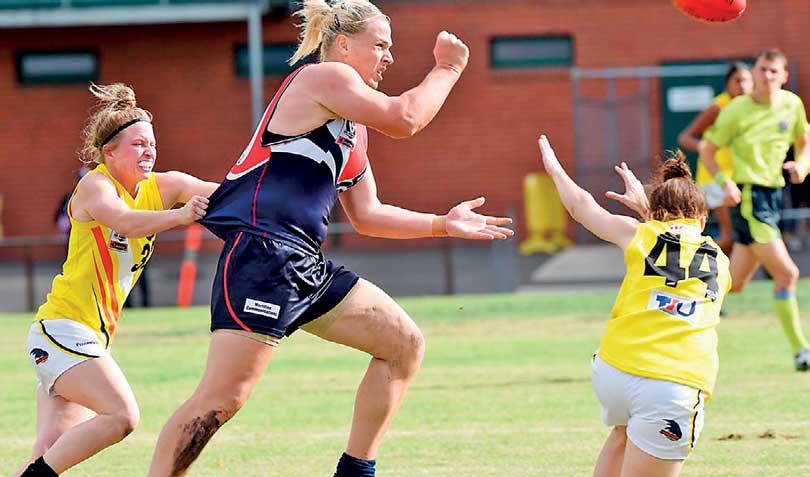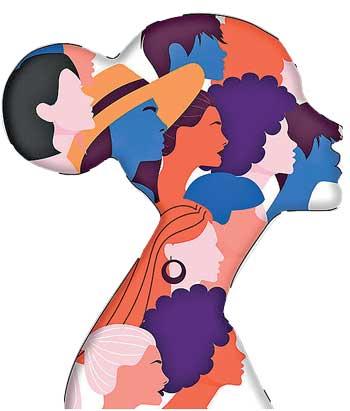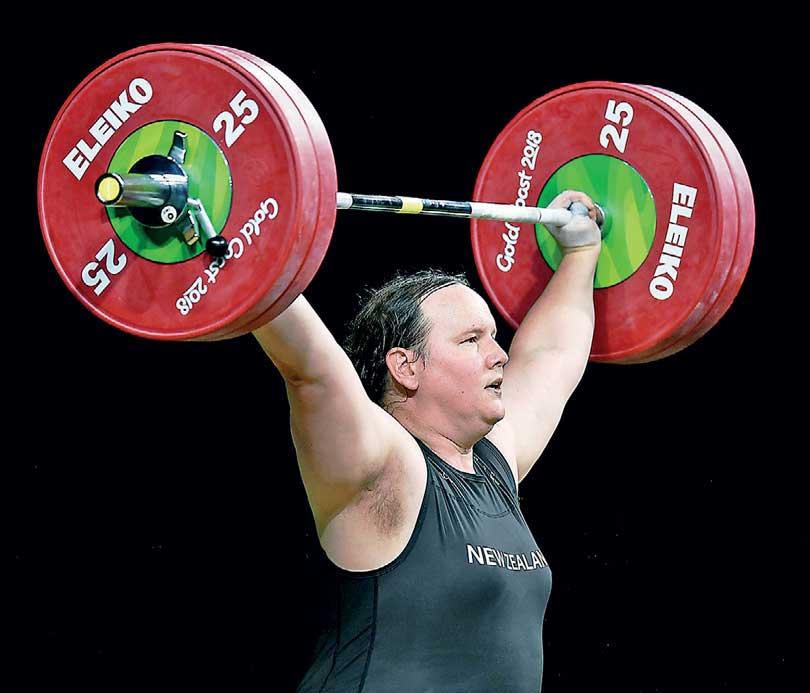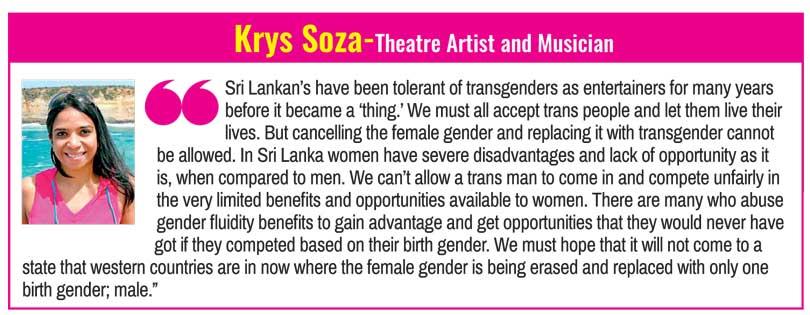27 May 2023 - {{hitsCtrl.values.hits}}
 Trans athlete playing women’s rugby
Trans athlete playing women’s rugby
 Last week, I decided to involve my friends and family who follow my private Instagram account by sharing an article from the UK’s Daily Mail newspaper. The article focused on the public’s strong reaction to an Adidas campaign that showcased a biological male modelling female swimwear, which caused widespread outrage globally. This article was followed by a second article published in the New York Post, titled ‘University of Wyoming sorority sisters say they live in fear of trans member.’ The article focused on a group of University of Wyoming sorority sisters who are suing their sorority for accepting a transgender woman into their all-female accommodation and they describe how they live in constant fear after the hulking student has become physically aroused around them. During the engaging dialogue sparked by the two articles, most people shared their thoughts and comments by sending me messages to my inbox. However, there was one acquaintance, an activist with political aspirations, who identifies as a gay man, who expressed his opinions in a lengthy and somewhat
Last week, I decided to involve my friends and family who follow my private Instagram account by sharing an article from the UK’s Daily Mail newspaper. The article focused on the public’s strong reaction to an Adidas campaign that showcased a biological male modelling female swimwear, which caused widespread outrage globally. This article was followed by a second article published in the New York Post, titled ‘University of Wyoming sorority sisters say they live in fear of trans member.’ The article focused on a group of University of Wyoming sorority sisters who are suing their sorority for accepting a transgender woman into their all-female accommodation and they describe how they live in constant fear after the hulking student has become physically aroused around them. During the engaging dialogue sparked by the two articles, most people shared their thoughts and comments by sending me messages to my inbox. However, there was one acquaintance, an activist with political aspirations, who identifies as a gay man, who expressed his opinions in a lengthy and somewhat  intimidating manner. I decided not to engage him in dialogue because his stance was quite evident: anyone who disagreed with his opinion risked facing his anger, which included, intimidation, and cyberbullying. Intrigued by his reaction, I took some time to reflect on his public posts containing subtle intimidating messages. What stood out was that this individual never raised his voice or attempted to intimidate his male friends or male family members who frequently shared derogatory posts and jokes about the trending topic of gender identity on social media. It became clear that his standpoint was that ‘men will be men’ and ‘boys will be boys,’ implying that it was acceptable for them to make inappropriate jokes. This contradictory response highlighted one undeniable fact: regardless of how a man chooses to identify himself, he often seeks to silence women through threats, raised voices, intimidation, and, in today’s era of social media, cyberbullying, thus suppressing their voices. Motivated by his response, I felt compelled to explore the deeper nuances surrounding the topic of gender identity and the conversation of a biological man’s identification as a woman, even after undergoing a transition.
intimidating manner. I decided not to engage him in dialogue because his stance was quite evident: anyone who disagreed with his opinion risked facing his anger, which included, intimidation, and cyberbullying. Intrigued by his reaction, I took some time to reflect on his public posts containing subtle intimidating messages. What stood out was that this individual never raised his voice or attempted to intimidate his male friends or male family members who frequently shared derogatory posts and jokes about the trending topic of gender identity on social media. It became clear that his standpoint was that ‘men will be men’ and ‘boys will be boys,’ implying that it was acceptable for them to make inappropriate jokes. This contradictory response highlighted one undeniable fact: regardless of how a man chooses to identify himself, he often seeks to silence women through threats, raised voices, intimidation, and, in today’s era of social media, cyberbullying, thus suppressing their voices. Motivated by his response, I felt compelled to explore the deeper nuances surrounding the topic of gender identity and the conversation of a biological man’s identification as a woman, even after undergoing a transition.
BEING A WOMAN
Being a woman is a multi-faceted and deeply personal experience that transcends biological differences. It encompasses a rich tapestry of identities, roles, and aspirations that have evolved over time. In today’s world, the understanding of womanhood has expanded to embrace diversity, empowerment, and selfdetermination. Being a woman entails a multitude of experiences and challenges that shape our journey through life. One fundamental aspect is the occurrence of menstruation, a natural process that not only brings physical changes but also carries with it a range of emotions and experiences. From the discomfort of menstrual cramps to the management of menstrual hygiene, it is a monthly reminder of our bodies’ intricate workings. As a teenager, I would often skip one day of school each month owing to the discomfort caused by my monthly cycle, and even whilst attending school, I would constantly be nervous of staining my school uniform, as I went to a co-ed international school. Another significant aspect of womanhood is the potential to bear children and the transformative experience of pregnancy. The joys, uncertainties, and physical demands associated with pregnancy are profound and deeply personal. The responsibility of nurturing new life within oneself is meant to be a unique and awe-inspiring experience that often brings a sense of fulfilment and connection to our femininity. However, alongside these remarkable aspects of womanhood, there are also challenges that we face on a societal level.
Throughout history, women have engaged in a relentless and arduous struggle to secure their rightful place in society. This battle for equality and recognition has been fought with determination, resilience, and unwavering courage. However, it is important to acknowledge that this fight is far from over, as women still face significant challenges and continue to be one of the most marginalized groups in society. Women have had to contend with systemic barriers, discriminatory practices, and deeply ingrained gender biases that limit their opportunities and undermine their contributions. Despite tremendous progress in various areas, such as education and workforce participation, women often encounter glass ceilings, unequal pay, and limited representation in positions of power and leadership. The fight for women’s rights encompasses various dimensions, including economic empowerment, political representation, reproductive rights, access to education and healthcare, and the eradication of violence and discrimination. Women from diverse backgrounds, including those from marginalized communities, face intersecting forms of oppression and must confront additional hurdles in their quest for equality. Hence the reason it’s imperative that we safeguard women and their hardearned seat at the table at all costs.
THE TRANSGENDER CONVERSATION
This draws me back to an article I published in the Daily Mirror newspaper on the 18th of March 2023, titled ‘Wokeism: The Transgender and Drag Queen Conversation.’ I concluded this
article by stating that perhaps it is time, the world legally recognized and identified a third gender category to accommodate trans individuals separately. This ideology arises from a well-intentioned desire to address the concerns of all parties involved, and to ensure trans individuals are protected with equal rights and legal protections as men and women are. Addressing the concerns and facilitating dialogue between different groups is crucial in navigating this complex issue. By fostering an environment of understanding and acceptance, we can work towards creating independent safe spaces that accommodate the needs of cisgender women and trans individuals, while respecting the rights and identities of all individuals involved. In recent years, the issue of trans women’s access to women’s spaces has generated significant debate and discussion. Advocates argue that transwomen should have unrestricted access to women’s locker rooms, sorority houses, bathrooms, sporting events, and other gendersegregated spaces. Others contend that these spaces should be reserved exclusively for cisgender women, suggesting the creation of a third gender category to accommodate trans women separately. For example, the preference of conservative Muslim women to visit salons exclusively for women is rooted in cultural and religious practices that prioritize privacy and modesty. It is important to respect their choices and create spaces where they feel comfortable and respected.
However, it is crucial to approach the issue of accommodating transgender individuals in these spaces with sensitivity and a commitment to inclusivity. Transgender rights and inclusivity are important considerations in promoting equality and social acceptance. It is essential to ensure that transgender individuals too have access to safe and supportive spaces where they can feel comfortable and affirmed in their gender identity. At the same time, it is important to address the concerns of conservative Muslim women who may have reservations about sharing these spaces. One way to approach this issue is to establish separate spaces to accommodate the preferences and needs of both groups. This could involve designating certain salons exclusively for women, while also providing transgender individuals with access to inclusive salons or alternative options that meet their needs. Furthermore, fostering dialogue and education within communities can help increase understanding and empathy, allowing for a more nuanced approach to gender identity and the diverse needs of individuals. By promoting acceptance and openmindedness, we can work towards a society that respects the rights and identities of all individuals, including transgender people, and propagate for the legal recognition of a third gender. It is worth noting that the concept of a third gender has been recognized and embraced by various cultures throughout history.
In Sri Lanka,young men temporarily wear an orange robe and gain admission to state universities through a quota reserved for the clergy; this example clearly highlights the potential for misuse and exploitation.
WOMEN’S QUOTAS
In an attempt to increase women’s participation in the workplace, at universities and in politics, several countries globally have implemented quotas or affirmative action policies. In 2003, Norway introduced a law that requires publicly listed companies to have at least 40% of their board members as women. This quota has led to significant improvements in women’s representation on corporate boards. Following the genocide in 1994, the Rwandan government implemented a quota system that reserves 30% of parliamentary seats for women. As a result, Rwanda has consistently ranked among the top countries globally in terms of women’s political representation, with women holding more than 60% of parliamentary seats. Similarly in India, the government introduced quotas for women in local government bodies known as Panchayats and Municipalities.
The 73rd and 74th Constitutional Amendments in 1992 mandated that at least onethird of seats be reserved for women in these local elected bodies. This quota system has been instrumental in enhancing women’s political participation at the grassroots level. Political parties in Sweden have voluntary gender quotas, ensuring that a certain percentage of candidates are women. Additionally, Swedish universities have actively pursued gender equality policies, striving to achieve balanced representation among students and faculty. South Africa has adopted quotas to promote women’s representation in politics. The African National Congress has implemented a 50% gender quota, requiring that women make up at least
It would be inappropriate to utilize events and awareness campaigns during Pride Month to applaud cisgender men or cisgender women, as this would divert attention away from the LGTBIQ+ community members.
half of the party’s candidates for elected positions. These are just a few examples of countries that have implemented quotas or affirmative action policies to increase women’s representation in the workplace, in universities and in politics. Many other nations have also taken measures to address gender imbalances and promote gender equality in various spheres of society. Should women now share these quotas with transwomen? Should a biological man who loses an election, transitions and re-enters politics as a transwoman have access to the quota reserved for cisgender females? In Sri Lanka, young men temporarily wear an orange robe and gain admission to state universities through a quota reserved for the clergy; this example clearly highlights the potential for misuse and exploitation. Striking a balance between ensuring equal opportunities for marginalized groups and preventing abuse of quotas is a challenge that requires thoughtful examination and appropriate safeguards. The idea of creating a third gender category as an alternative solution is hence the ideal approach that some societies have considered and perhaps it’s time all governments across the world consider doing the same.
It aims to recognize and protect the rights of individuals who do not identify strictly as male or female. Implementing a third gender category can provide legal recognition and protections for those who fall outside the traditional binary gender system.
THE THIRD GENDER CATEGORY
Introducing a recognized third gender category can help preserve spaces traditionally designated for women. Women are celebrated worldwide on International Women’s Day, which serves as a dedicated day to honour their remarkable achievements. Similarly, the LGBTIQ+ community, including transgender individuals, have an entire month dedicated to them known as Pride Month, celebrated in June. It would be inappropriate to utilize events and awareness campaigns during Pride Month to applaud cisgender men or cisgender women, as this would divert attention away from the LGTBIQ+ community members. Similarly, it is unfair that women must now share their one designated day with members of the transgender community. USA Today faced intense criticism for recognizing Leigh Finke, a legislator assigned male at birth, as one of its 2023 Women of the Year. Critics condemned this decision, viewing it as another instance of maleto- female transgender individuals encroaching upon awards intended specifically for girls and women. Another international news story that pops into my mind when writing this article is the case of US Swimmer, Lia Thomas, a transgender female.
Her inclusion as a member of the women’s swim team sparked debates and discussions globally, after she broke multiple records as a member of the women’s team, records she was previously unable to break as a member of the men’s swim team. These situations raise complex questions regarding transgender inclusion in sports and considerations of fairness and competitive advantage. Some organizations have implemented guidelines that allow transgender women to compete in women’s categories after meeting specific eligibility criteria, such as hormone therapy or time since transitioning. Critics of these policies argue that transgender women who were assigned male at birth may retain certain physical advantages, such as bone density or muscle mass, which could potentially give them a competitive edge over cisgender women. They express concerns about fairness and the potential impact on the integrity of women’s sports. Another similar case was that of Laurel Hubbard, a transgender woman weightlifter from New Zealand, who was the subject of controversy in the sport. In 2017, she became the first transgender woman to compete at the international level in weightlifting.
Critics argue that her previous physiological advantages as a male athlete may have given her an unfair advantage over cisgender women. Another incident that sparked a debate was Connecticut’s policy allowing transgender girls to participate in girls’ high school sports. This decision has faced criticism and legal challenges. Some argue that the inclusion of transgender girls in track and field competitions led to an unfair advantage due to potential differences in strength and hormone levels. These cases illustrate the complexities surrounding transgender women’s participation in women’s sports and the ongoing debates about fairness. Hence why it is important to identify a third gender and create a third category in sports so that all individuals can have a fair chance. Furthermore, the concerns regarding the inclusion of transwomen in women’s spaces often revolve around the notion of safety and privacy.

Trans Athlete Laurel Hubbard
Lia Thomas wins the National Swim Championships
Going back to the case of Lia Thomas, fellow teammate, Riley Gaines, claimed that she was taken by surprise when transgender swimmer Lia Thomas, “dropped her pants and exposed male genitalia in the women’s locker room.” Riley claimed female swimmers were not, “forewarned beforehand that we would be sharing a locker room with Lia. We did not give our consent; they did not ask for our consent. In that locker room, we turned around and there’s a 6’4 biological man dropping his pants and watching us undress, and we were exposed to male genitalia. Not even probably a year, two years ago, this would have been considered some form of sexual assault, voyeurism. But now not even are they just allowing it to happen, it’s almost as if these large organizations are encouraging it to happen,” stated Riley during an interview with US media.
Similarly, in the UK, a transgender rapist has been jailed for life after she attacked vulnerable women in the female prison, she was incarcerated in. Karen White, a transwoman, admitted sexually assaulting women in a female prison and raping another two women outside jail. It is hence vital to acknowledge that safety concerns are valid and require thoughtful consideration. However, it is equally important to recognize that transwomen, like cisgender women, also need safe spaces where they can feel comfortable, accepted, and protected. Balancing the needs and rights of all individuals involved is essential in creating safe and inclusive spaces for everyone. Viable option? Three legally recognized genders.
THE ALLIES
Women have consistently stood as staunch supporters and allies of the LGBTIQ+ community, advocating for their rights, equality, and justice. In our role as content creators for Wijeya Newspapers Limited’s digital media platforms, my team and I have taken significant steps to contribute to this cause. We were pioneers in the country, producing a ground-breaking political talk show hosted by a prominent transgender woman; Political Katha with Bhoomi, on Lankadeepa Online. Despite facing numerous complaints and criticism from conservative viewers, we persevered, making a significant impact across the island.
Each year, during Pride month, we dedicate ourselves to producing ground-breaking content in all three languages, aimed at raising awareness, educating the public, and providing a safe space for vulnerable members of the beloved LGBTIQ+ community to share their stories. Through campaigns such as #BetterTogether and #SupportEquality, we successfully published and publicized impactful statements from members of the LGBTIQ+ community and national leaders like SJB Member of Parliament Dr. Harsha de Silva, NPP Member of Parliament Harini Amarasuriya, Minister Jeevan Thondaman, and global cricket icon Mahela Jayawardene. These campaigns have left a lasting impression both across the island and within the corridors of power. We were delighted to come across news about a bill being presented in parliament by SLPP Member of Parliament Premanath Dolawatte, which calls for the decriminalization of homosexuality in Sri Lanka. This bill, long overdue, should be enacted without any further delays.
We are proud to witness progress being made towards achieving equality and ensuring that the rights and freedoms of all individuals, regardless of their sexual orientation or gender identity, are protected. As advocates for both inclusivity and social justice, we are committed to utilizing our voice and influence to uplift and amplify the voices of the LGBTIQ+ community. Simultaneously, I remain dedicated to advocating for the protection of women’s rights. I firmly believe that true equality for all can only be achieved by advocating for the legal recognition of a third gender. By recognizing a third gender and enshrining equal rights and protections for all three genders in law and the constitution, we can foster a society that values and upholds the rights of every individual, irrespective of their gender identity. This approach embraces the diversity of human experiences and ensures that no one is marginalized or excluded based on traditional gender binaries. I understand that achieving legal recognition for a third gender requires ongoing dialogue, collaboration, and the engagement of diverse perspectives. It is through respectful and informed conversations that
we can work towards creating a society that values and respects the rights of all individuals, regardless of their gender identity, and not by intimidating or threatening with violence and thereby silencing the voices of women. We all need to be committed to play an active role in advocating for the legal recognition of a third gender, promoting inclusivity, and striving for a society where everyone can live with dignity, equality, and freedom. By standing together and advocating for these important causes, we can work towards a more just and inclusive future for all.



23 Dec 2024 15 minute ago
23 Dec 2024 46 minute ago
23 Dec 2024 52 minute ago
23 Dec 2024 1 hours ago
23 Dec 2024 2 hours ago